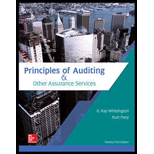
Concept explainers
Identify three revenue accounts and related
Explanation of Solution
Auditing operations:
The auditors while examining the operations, the liabilities and assets get verified along with the accounts of expenses and revenue from the income statements. The auditors will use the product mix from the analytical procedure, cross-referencing, and analyzing the particular transactions to identify the omissions, inconsistencies, and errors that remained to be disclosed from auditing the balance sheet accounts.
The revenue and related balance sheet accounts to be verified at the time of auditing balance sheet accounts:
Sales accounts, royalty, and interest earned are three revenue accounts whereas accounts and notes receivables, intangible assets, and investments are three related three balance sheet accounts to be verified while auditing the balance sheet accounts.
Want to see more full solutions like this?
Chapter 16 Solutions
Principles Of Auditing & Other Assurance Services
- I need help with this general accounting question using the proper accounting approach.arrow_forwardGreen, an individual taxpayer who is not a day trader, has requested assistance from a CPA to calculate Year 2 gains and/or losses on the sale of various shares of stock. For each of the following transactions, calculate the correct gain or loss and enter the amount in the associated box in the Gain or Loss column. 4. Sold 1,225 shares of ABC Corp. stock at $9 per share. Green purchased 600 shares several years ago at $30 per share. Three years ago, when the stock price was $21, there was a 2-for-1 stock split, and two years ago, when the stock price was $25, there was a 3-for-2 stock split. No other shares were sold by Green before Year 2. 5. Sold 500 shares of XYZ Corp. stock at $20 per share. Green purchased these shares two years prior at $22 per share. Three weeks prior to the sale, Green purchased 100 shares of XYZ stock at $18 per share. 6. Sold 1,600 shares of BX Corp. stock at $4 per share. Green received these shares as a gift from his sister four years ago. The fair market…arrow_forwardAlessandra Manufacturing produces various electronic components. Last year, the company's variable costing net operating income was $92,400, and ending inventory increased by 1,800 units. Fixed manufacturing overhead cost per unit was $5. Determine the absorption costing net operating income for last year.arrow_forward
- Green, an individual taxpayer, who is not a day trader, has requested assistance from a CPA to calculate Year 2 gains and/or losses on the sale of various shares of stock. For each of the following transactions, calculate the correct gain or loss and enter the amount in the associated box in the Gain or Loss column. 1. Sold 200 shares of Y Corp. stock at $14 per share. Green received the 200 shares as a gift from his brother three years ago, when the shares had a fair market value of $10 per share. Green's brother purchased the stock for $16 per share. 2. Sold 200 shares of Y Corp. stock at $22 per share. Green received the 200 shares as a gift from his brother three years ago, when the shares had a fair market value of $26 per share. Green's brother purchased the stock for $16 per share. 3. Sold 450 shares of Z Corp. stock at $40 per share. Green received the 450 shares from his aunt's estate as a bequest. The fair market value of the stock at the date of his aunt's death was $32 per…arrow_forwardI am looking for help with this financial accounting question using proper accounting standards.arrow_forwardHelparrow_forward
- Job 786 was one of the many jobs started and completed during the year. The job required $8,400 in direct materials and 35 hours of direct labor time at a total direct labor cost of $9,300. If the job contained five units and the company billed at 70% above the unit product cost on the job cost sheet, what price per unit would have been charged to the customer?arrow_forwardWhat is the company's gross profit?arrow_forwardMOH Cost: Top Dog Company has a budget with sales of 7,500 units and $3,400,000. Variable costs are budgeted at $1,850,000, and fixed overhead is budgeted at $970,000. What is the budgeted manufacturing cost per unit?arrow_forward
 Auditing: A Risk Based-Approach (MindTap Course L...AccountingISBN:9781337619455Author:Karla M Johnstone, Audrey A. Gramling, Larry E. RittenbergPublisher:Cengage Learning
Auditing: A Risk Based-Approach (MindTap Course L...AccountingISBN:9781337619455Author:Karla M Johnstone, Audrey A. Gramling, Larry E. RittenbergPublisher:Cengage Learning Auditing: A Risk Based-Approach to Conducting a Q...AccountingISBN:9781305080577Author:Karla M Johnstone, Audrey A. Gramling, Larry E. RittenbergPublisher:South-Western College Pub
Auditing: A Risk Based-Approach to Conducting a Q...AccountingISBN:9781305080577Author:Karla M Johnstone, Audrey A. Gramling, Larry E. RittenbergPublisher:South-Western College Pub


